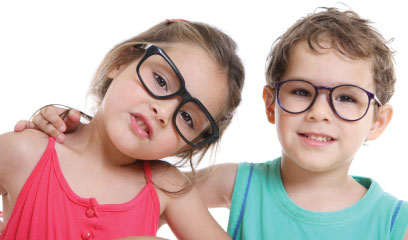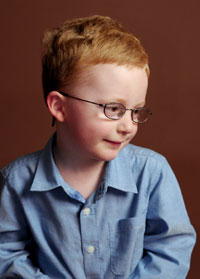 Farida Dowler suspected something was wrong with her daughter’s eyes right from birth. When Maddalena was 9 months old, Dowler took her to a pediatric ophthalmologist, who diagnosed her with a rare eye condition called persistent hyperplastic primary vitreous (PHPV), which means the retina in her left eye was folded. Now Maddalena is 5 and wears glasses.
Farida Dowler suspected something was wrong with her daughter’s eyes right from birth. When Maddalena was 9 months old, Dowler took her to a pediatric ophthalmologist, who diagnosed her with a rare eye condition called persistent hyperplastic primary vitreous (PHPV), which means the retina in her left eye was folded. Now Maddalena is 5 and wears glasses.
“When we knew she would need to wear glasses, we bought her cheap sunglasses with very little tinting to practice with,” says Dowler, a Seattle resident. “She thought that was glamorous.”
In Maddalena’s case, it was easy to tell that she needed medical intervention — one of her eyes is smaller than the other. But many of the signs that a child needs glasses aren’t that obvious. If your preschooler rubs her eyes, sits very close to the TV or a computer monitor, uses her finger as a marker in a picture book or doesn’t have a good attention span while doing close-up activities, she may have a vision problem. When your child has difficulty seeing objects others can see, squints or closes one eye during a visual activity, experiences burning or itching or complains of headaches, poor vision might be the cause.
Most common vision problem
Amblyopia is the most common vision problem in preschool children, says Dr. Tom Lenart of the Children’s Eye Doctor in Redmond. Sometimes called “lazy eye,” amblyopia is loosely defined as one eye having poorer vision than the other.
“About one in 20 kids is born with amblyopia,” says Dr. Jen Galbraith, an optometrist in Harrisburg, Pennsylvania. “Amblyopia means that for whatever reason, the brain doesn’t get a clear image from the eye. This is extremely easy to treat when the child is young, but a little harder as he gets older.”
Kids may also experience astigmatism (the eye is not spherical), significant hyperopia (farsightedness) and strabismus (both eyes don’t look at the same point at the same time). On very rare occasions, kids might suffer retinal diseases, cataracts or glaucoma.
Taking action
Lenart says that if any of the following occur, it’s time to get your preschooler’s eyes examined:
If your pediatrician suspects a vision problem If a parent sees a problem If there’s a family history of eye problems
Experts agree that parents should take their child to someone who specializes in pediatric eye care. “Certainly a good general ophthalmologist who sees many children may be in a position to care for this age group as well,” says Dr. David B. Granet, director of pediatric ophthalmology at Ratner Children’s Eye Center at the University of California in San Diego. “For some routine issues, an optometrist who is trained in dealing with children may be just fine.”
Optometrists and ophthalmologists have different backgrounds, training and orientation. Typically ophthalmologists, who are medical doctors, go through four years of college, four years of medical school, one year of internship, three years of residency and then one to two years of fellowship, says Granet.
In the United States, optometrists must have a license, which requires a doctor of optometry degree from an accredited program as well as passing scores on a clinical state board and a written examination.
 Two vision myths
Two vision myths
Parents might think that the school-based vision screening they can get for their preschooler reveals any vision problems they might have.
“Schools only test visual acuity,” says Dana Cocké, O.D., who has practices in Seattle and Tacoma. “They don’t test for being farsighted or for focusing.”
Another common myth: Young children shouldn’t have nightlights. A study done in 1999 determined that using a nightlight for a child younger than 2 years old quadrupled that child’s chances of later developing myopia (nearsightedness). But researchers at Ohio State University found no association between nightlights and myopia. What the researchers did find was a strong link between nearsighted parents and nearsighted children, which wasn’t taken into account during the first study.
Lenart says parents know instinctively if something is wrong with their child, so if you have any concerns about your child’s vision, schedule an exam.
Heather Larson is a freelance writer in Tacoma who frequently writes on health and parenting topics.
How to keep glasses on a preschooler
1. Make sure the glasses fit properly. Buy them at an optical shop that specializes in fitting children.
2. Keep the glasses clean so the child can see clearly.
3. Remind the child that her vision will get worse if she doesn't wear her glasses.
4. Use persistence and positive rewards.
Originally published in the August, 2008 print edition of ParentMap.











